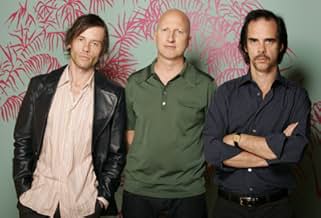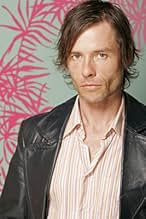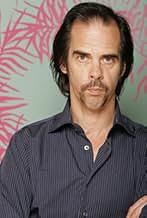एक पुलिसवाला एक कुख़्यात अपराधी को पकड़ता है और उसे अपने बड़े भाई को मारने के लिए नौ दिन देता है, वर्ना वे उसके छोटे भाई को मार देंगे.एक पुलिसवाला एक कुख़्यात अपराधी को पकड़ता है और उसे अपने बड़े भाई को मारने के लिए नौ दिन देता है, वर्ना वे उसके छोटे भाई को मार देंगे.एक पुलिसवाला एक कुख़्यात अपराधी को पकड़ता है और उसे अपने बड़े भाई को मारने के लिए नौ दिन देता है, वर्ना वे उसके छोटे भाई को मार देंगे.
- पुरस्कार
- 14 जीत और कुल 30 नामांकन
फ़ीचर्ड समीक्षाएं
Directed by Brisbanite John Hillcoate from a script by Aussie indie icon Nick Cave, this film has some of the most gorgeous photography of the Australian outback ever committed to film, showcasing it's unique desolate beauty in it's dust, flies and exquisite sunsets.
Hillcoate assembles a very fine ensemble cast, most notably Ray Winstone as Captain Stanley and Guy Pearce as Charlie Burns - two actors performing at the top of their game. Danny Huston is effective as Arthur Burns, a man whose serene exterior belies his vicious temperament. Other performers include Emily Watson and John Hurt, as well as fine Australian talent David Wenham, Leah Purcell, Tommy Lewis and quintessential movie aborigine David Gulpilil. All performances are excellent.
Despite it's high violence quotient, the film has an admirable lack of moralistic tone. There are no obvious good guys and bad guys, all the characters are shades of grey possessing both positive and negative attributes, although some characters may lean one way or the other. In particular, Captain Stanley has a good heart though history may judge his methods of justice with contempt, and Charlie Burns has a fierce sense of loyalty and honour but his associated family ties have led him to commit horrific crimes. Even Captain Stanley's wife, Martha, in all her Victorian innocence and naivety, has a dark side to her soul; an attribute which will further propel all towards their destinies.
It's strong subtext of white colonialists' condescending treatment of the aboriginal population puts this film in fine company with other Australian indigenous-themed films such as Fred Schepisi's The Chant Of Jimmy Blacksmith, Nicholas Roeg's Walkabout, Rolf de Heer's The Tracker and Phillip Noyce's Rabbit Proof Fence. The Proposition is the best of these. This is a big call, I know, but the fact is that none of those other very fine Australian films possess the tension which so completely permeates Hillcoates' picture. This film represents a major achievement for both Hillcoate and Cave and is the best Australian film to leave these shores since Ray Lawrence's Lantana.
8.5 out of 10.
Slick. :cool:
Captain Stanley goes after the murderous Burns brothers by setting them against each other. His proposition is that middle brother Charlie kill older brother Arthur, in order to save younger brother Mike from the noose. It is expedient justice but also astute psychology on Stanley's part; Charlie seems less than reluctant to take on the task of dispensing with his charismatic but psychotic older sibling.
Stanley's mantra is that he will civilize this land, but his failing is in choosing the wrong target. His treacherous sergeant, feeble superior, and uptight wife together conspire through ignorance and fear to undo the Captain's intent. When Mike is flogged beyond reason and physical endurance, the Captain's moral argument is won, but perhaps at the price of all their lives, as the Burns brothers come seeking vengeance.
Pearce adds impressively to his CV, in an understated but powerful performance as the brooding middle brother. Stanley is not exactly a good guy, but as much on the side of good as it is possible to be in this God-forsaken landscape. It has taken a while to get used to Winstone in such roles, starting with Sexy beast, but he is wearing them with aplomb now. Danny Huston is a pleasant surprise as the educated but deranged Arthur, while John Hurt revels in playing against type. Emily Watson, never less than excellent, embodies the prim Victorian. My own first impression of Australia was flies, flies, flies, and Hillcoat captures this. The question is not why there are so many flies in this film, but why they are curiously absent from other Australian films. They are both a metaphor for the squalor and decay that infest existence, and an acutely observed detail of the arena.
Before the British, other Europeans famously arrived in Australia but considered the landscape uninhabitable. Threaded through The Proposition is the suggestion that they were right.
The broader reference is the existence of our dark side, embodied in Arthur, a Kurtz-like figure, a god-like presence in an inhospitable landscape, facing an assassin dispatched from a 'civilization' that does not like what he reminds them of. The film references Conrad's infamous tale but anchors it in this universal tale of white men's ill-fated attempts to conquer a land where they do not belong. The aborigines tolerate them, or despair of them. "Strange, you whities" says Jacko, while house servant Tobey shows his role as subservient ends at the garden gate, where he leaves his boots and returns to his barefoot roots. Two Bob simply abandons his white mates at the end. Like the land, their attitudes to these invaders range from indifferent to hostile.
The Proposition is less poetic violence than violent poetry. Too much to take in here in one viewing, in time to come this might just match Walkabout as the masterpiece of Australia-set cinema.
You always know what you're going to get with a film by Australian director John Hillcoat namely strong memorable drama that's best viewed with a ready supply of anti-depressants . You also know what you're not going to get , laughs , mirth and a strong narrative drive . Certainly both GHOSTS OF THE CIVIL DEAD and THE ROAD suffered slightly from a lack of a strong narrative drive and in this British produced pseudo Western set in 19th Century Australia there's also a sign of this flaw from the director
The premise is one that grabs you and leads you to ask what you would do in that situation but as soon as Charlie leaves town on his quest the story meanders slightly as we're shown lots of panoramas of the Australian outback with a vague mystical air which will remind you of Australian cinema of the 1970s where the landscapes were the stars of the movie . One also gets the feeling in the first third that you're might be watching an Aussie version of APOCALYPSE NOW where a man with a mission involving extreme prejudice finds his target building an empire amongst the natives
This doesn't happen thankfully and after a slightly unfocused first 40 minutes the story gets back on track with characterisation coming to the fore . THE PROPOSITION is much more character driven than the premise promises . There is a slight cop out in that Mickey is the poor unintelligent younger brother who has merely tagged along with the gang through family peer pressure and while Arthur isn't portrayed by Danny Huston as a stock psychotic villain with staring eyes and manic laugh his actions do more than enough to convince the audience that this rabid criminal dog needs to be put out of his misery . The characterisation between the good younger brother and the violent bad older brother could been written and developed as a bit more grey but there again it might have made it more difficult to cheer on Charlie the middle brother played by Guy Pearce
The cast are excellent and special mention goes to Ray Winstone who is a national institution in Britain and watching him here you're aware of how underrated he is and gives a depth to Captain Stanley a man tormented by trying to uphold the law without giving in to rough justice from the locals . It's perhaps difficult to believe a rough working class bloke would be married to Emily Watson's rather middle class Martha but Watson does manage to project an innocence that seems out of place but that's undoubtedly the point . One character that did puzzle me was Jellon Lamb . John Hurt of course steals the show every scene he appears in but is there any point to the character except to spout Darwin ? it's a slightly confused and unnecessary character
And THE PROPOSITION is a slightly confused film that stops it from attaining true classic status . It's a bleak nihilistic character study from John Hillcoat and contains all the strengths and weaknesses from the director's prior and future work . That said it's much better than most of the films the UK Film Council insist on wasting their money on from the same period
There's a fantastic blend of European and Australian sensibilities here that makes this the least clichéd film to come out of this country for 20-odd years - and if it doesn't do well, it'll be because an increasingly soft and gutless nation is afraid to venture out of their frappuccino and mortgage comfort zone.
This is powerful, worthy art.
क्या आपको पता है
- ट्रिवियाIn a 2018 interview, Guy Pearce said that this is his favorite of all of the movies he's ever done.
- गूफ़Although the story takes place in the 1880s, Jellon sings "Danny Boy" - which wasn't published until 1913.
- भाव
Jellon Lamb: Forgive me, sir, but I've been stuck here with no one but this sorry sack of Hibernian pig shit for conversation. Poor, poor Dan O'Reilly. Sit, sir. Drink with me.
[Charlie cocks his gun and points it to Lamb]
Charlie Burns: One more crack about the Irish, Mr. Lamb, and I'll shoot you. Am I clear?
Jellon Lamb: Oh, as the waters of Ennis, sir. Let us drink, then, to the Irish. No finer race of men have ever... peeled a potato.
[Charlie cocks his gun again and points it to Lamb]
Charlie Burns: Do you pray, Mr. Lamb?
- क्रेज़ी क्रेडिटThe opening credits are shown first against a background of period photographs of Australia, which after a time become photographs of the actors/characters, locations and scenes in the film. The end credits are similarly displayed, but only period photographs are used. This is of special note in view of the noted disclaimer, since some indigenous aboriginal groups can be offended by such images.
- साउंडट्रैकThere Is a Happy Land
(1850)
Traditional
Music by Leonard P. Breedlove (uncredited) (1850)
Words by Andrew Young (1838)
Arranged by Nick Cave and Warren Ellis
टॉप पसंद
- How long is The Proposition?Alexa द्वारा संचालित
विवरण
बॉक्स ऑफ़िस
- बजट
- $2,00,00,000(अनुमानित)
- US और कनाडा में सकल
- $19,03,434
- US और कनाडा में पहले सप्ताह में कुल कमाई
- $32,681
- 7 मई 2006
- दुनिया भर में सकल
- $50,48,893
- चलने की अवधि1 घंटा 44 मिनट
- रंग
- ध्वनि मिश्रण
- पक्ष अनुपात
- 2.39 : 1
इस पेज में योगदान दें








































